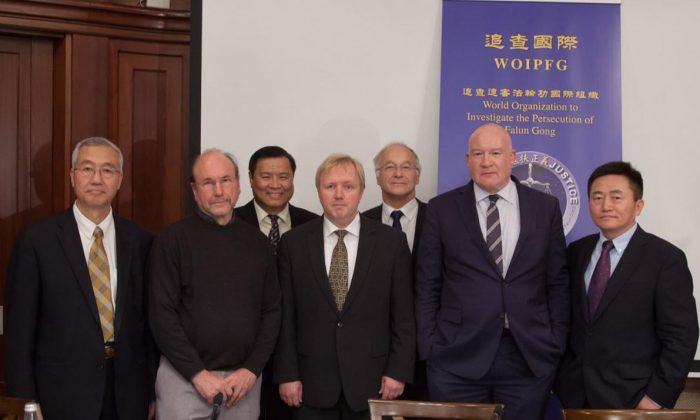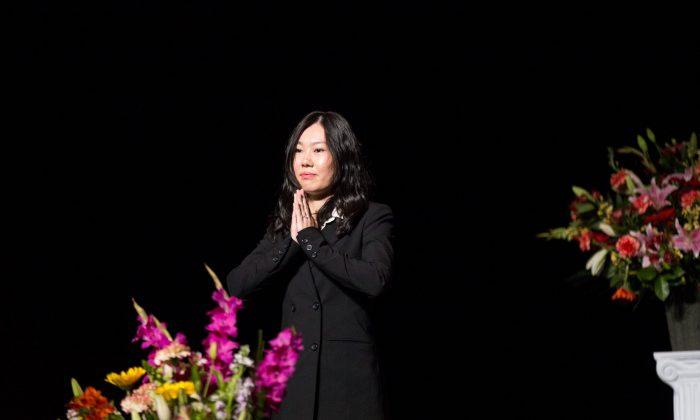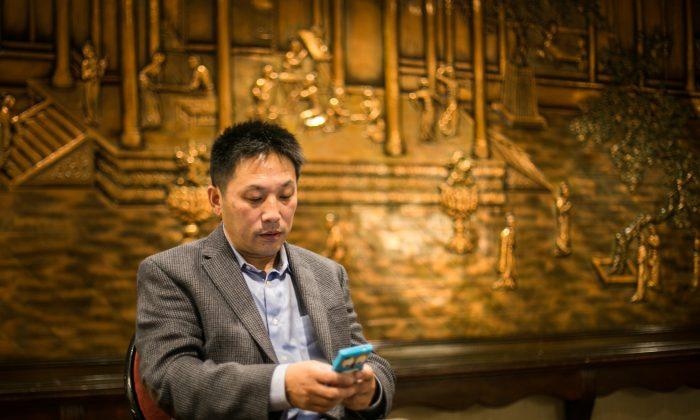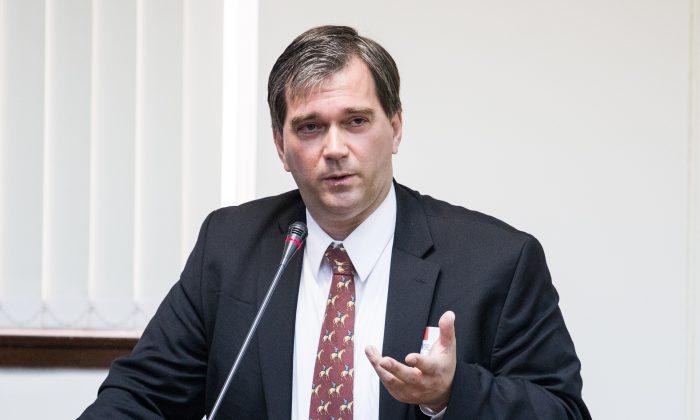A series of editorials published with a penname in the official mouthpieces People’s Daily and Xinhua have affirmed what everyone already knew: the Chinese Communist Party [CCP] will not be relinquishing its monopoly on power, and everyone should “firmly maintain the correct political direction” and “unswervingly maintain the Party’s leadership.”
The editorials, now five in number, began appearing on Oct. 21, and have kept apace—one every couple of days—since then.
Taking such titles as “In The Period of Great Opportunity, Be Enthusiastic and Press On,” “Win the Future by Hastening the Methods of Economic Development,” and “Actively and Steadily Advance Political Reform Along the Correct Political Path,” the notices appear to be the CCP’s idiosyncratic way of clarifying its position on Premier Wen Jiabao’s proposals for “political reform,” which he brought up eight times over the last several months.
They are the first “official” statements on the matter from the central leadership since the Fifth Plenary Session, a large Party conference, which took place two weeks ago.
“This is an old CCP habit,” says Hu Ping, editor in chief of Beijing Spring, a Chinese pro-democracy journal. “They like to propagandize their policies and decisions after the big meetings.”
Before the session, Wen Jiabao had on a handful of occasions touched on political reform, democratization, and what he called “universal values.” Hu Ping says, “This kind of thing provokes a certain discussion in the Party and among the people, so the leaders want to clearly transmit the Party central’s message, suppress the divergent voices, and unify thoughts.”
While there were some ambiguities in the editorials he says, “The central tone is very clear: the Party is not going in for any political reform. They got this message across clearly.”
Western media reported on an editorial in People’s Daily that seemed to be at odds with Wen’s remarks about political reform. Its full title was “Actively and Steadily Advance Political Reform Along the Correct Political Path: third commentary on grasping the historical opportunity and building a moderately prosperous society.”
But the reports neglected to mention that this was actually the third editorial published under the penname Zheng Qingyuan. Two articles had already been published under the same penname before then, on Oct. 21 and Oct. 25.
In contrast to the two that preceded it, the piece of Oct. 27 spoke out against changing the current set-up in China.
The articles run at over 2,000 words each and adopt a variety of rhetorical styles, according to an analysis by Zhang Haishan, a columnist for the Chinese edition of The Epoch Times. The stylistic differences—and the unusual way in which the third editorial was publicized for a second time—led him to speculate about whether the same penname had been usurped by the anti-Wen faction, to deliver a sharp rebuttal to the Premier’s previous remarks on reform.
The first two editorials spoke positively of reformist ideas, using somewhat softer and more nuanced language that contrasted strongly with the leftist bluster of the third piece. The first two were punctuated by four days, but the third was published just two days after the second (Oct. 27), followed the next day by another “update,” taking the form of a forum notice appearing to be from an ordinary citizen, reiterating the third editorial. Since the notice was published on the front page of Party mouthpiece media, it could not have been from any old citizen, Zhang says.
A fourth and fifth editorials followed, using slightly more measured language.
The name used to get the message out—Zheng Qingyuan—is similar in sound to the Chinese idiom “zhengbenqingyuan,” which means to thoroughly overhaul something.
The question of authorship is as yet unclear. Pennames are used by various Party departments to propagandize their latest theoretical achievements with pseudo-anonymity. Hu Ping says that whoever wrote it, whether “so-called Party theorists” or a group of high-level officials, “it must have come from a high place.
“All Party media had to copy it. Whoever it is, it’s clearly representing the voice of the highest levels of the Party central,” he said.
The final outcome was not surprising.
“Zheng Qingyuan’s essays are for the purpose of having the CCP protect, entrench, and strengthen its system of rule,” writes political commentator Wu Fan in an online essay. “The so-called ‘correct political direction’ is the Party’s totalitarian dictatorship … from Mao Zedong’s time to the Communist Party’s fifth generation of leaders today, it’s always about maintaining the CCP’s monopoly on everything, and everyone has to listen to them.”
The editorials, now five in number, began appearing on Oct. 21, and have kept apace—one every couple of days—since then.
Taking such titles as “In The Period of Great Opportunity, Be Enthusiastic and Press On,” “Win the Future by Hastening the Methods of Economic Development,” and “Actively and Steadily Advance Political Reform Along the Correct Political Path,” the notices appear to be the CCP’s idiosyncratic way of clarifying its position on Premier Wen Jiabao’s proposals for “political reform,” which he brought up eight times over the last several months.
They are the first “official” statements on the matter from the central leadership since the Fifth Plenary Session, a large Party conference, which took place two weeks ago.
“This is an old CCP habit,” says Hu Ping, editor in chief of Beijing Spring, a Chinese pro-democracy journal. “They like to propagandize their policies and decisions after the big meetings.”
Before the session, Wen Jiabao had on a handful of occasions touched on political reform, democratization, and what he called “universal values.” Hu Ping says, “This kind of thing provokes a certain discussion in the Party and among the people, so the leaders want to clearly transmit the Party central’s message, suppress the divergent voices, and unify thoughts.”
While there were some ambiguities in the editorials he says, “The central tone is very clear: the Party is not going in for any political reform. They got this message across clearly.”
Western media reported on an editorial in People’s Daily that seemed to be at odds with Wen’s remarks about political reform. Its full title was “Actively and Steadily Advance Political Reform Along the Correct Political Path: third commentary on grasping the historical opportunity and building a moderately prosperous society.”
But the reports neglected to mention that this was actually the third editorial published under the penname Zheng Qingyuan. Two articles had already been published under the same penname before then, on Oct. 21 and Oct. 25.
In contrast to the two that preceded it, the piece of Oct. 27 spoke out against changing the current set-up in China.
The articles run at over 2,000 words each and adopt a variety of rhetorical styles, according to an analysis by Zhang Haishan, a columnist for the Chinese edition of The Epoch Times. The stylistic differences—and the unusual way in which the third editorial was publicized for a second time—led him to speculate about whether the same penname had been usurped by the anti-Wen faction, to deliver a sharp rebuttal to the Premier’s previous remarks on reform.
The first two editorials spoke positively of reformist ideas, using somewhat softer and more nuanced language that contrasted strongly with the leftist bluster of the third piece. The first two were punctuated by four days, but the third was published just two days after the second (Oct. 27), followed the next day by another “update,” taking the form of a forum notice appearing to be from an ordinary citizen, reiterating the third editorial. Since the notice was published on the front page of Party mouthpiece media, it could not have been from any old citizen, Zhang says.
A fourth and fifth editorials followed, using slightly more measured language.
The name used to get the message out—Zheng Qingyuan—is similar in sound to the Chinese idiom “zhengbenqingyuan,” which means to thoroughly overhaul something.
The question of authorship is as yet unclear. Pennames are used by various Party departments to propagandize their latest theoretical achievements with pseudo-anonymity. Hu Ping says that whoever wrote it, whether “so-called Party theorists” or a group of high-level officials, “it must have come from a high place.
“All Party media had to copy it. Whoever it is, it’s clearly representing the voice of the highest levels of the Party central,” he said.
The final outcome was not surprising.
“Zheng Qingyuan’s essays are for the purpose of having the CCP protect, entrench, and strengthen its system of rule,” writes political commentator Wu Fan in an online essay. “The so-called ‘correct political direction’ is the Party’s totalitarian dictatorship … from Mao Zedong’s time to the Communist Party’s fifth generation of leaders today, it’s always about maintaining the CCP’s monopoly on everything, and everyone has to listen to them.”




